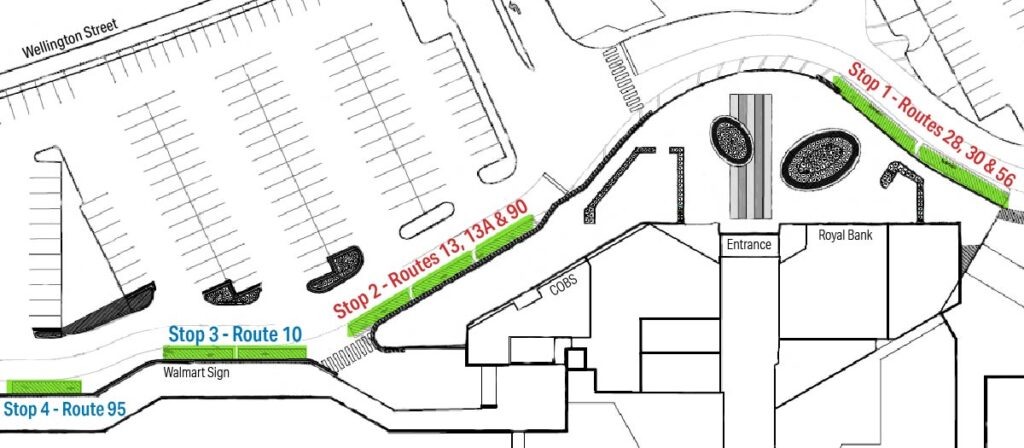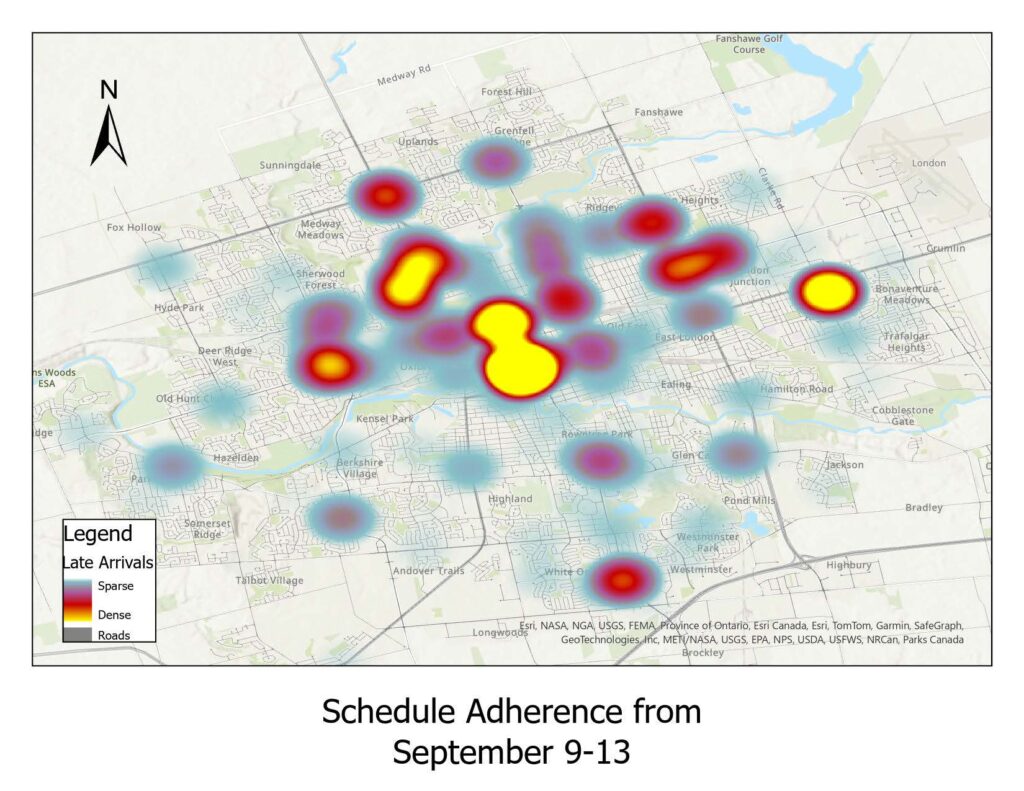Staff Report #2
September 25, 2024
To All Commissioners
Re: Fall Service Update – Conventional Transit
Recommendation
The report be NOTED and FILED.
Background
The month of September is the most challenging month for transit service providers as it is the time of year when service improvements are implemented in an effort to address what has been determined through the planning process as the most pressing issues on the service. Service is also adjusted back to fall levels given the return of post secondary students. Given service improvement plans are approved nine to twelve months in advance of implementation, there is a strong possibility that new issues not contemplated in the approved plan will arise. This is also the time of year when vacations end and the shift back to school and regular routines results in increased traffic and congestion. Given buses operate on the same corridors as all other vehicular traffic, this additional congestion can result in schedule adherence issues. It is typical to take three to four weeks for travel patterns to become set for both transit riders and those driving personal vehicles. Transit systems prepare for these issues by ensuring they have adequate buses available each day for the scheduled service as well as additional buses that can be utilized to address unforeseen crowding on routes/runs as travel patterns shift throughout the month.
External Factors Impacting Fall Service
In addition to the aforementioned typical September issues, this year’s impacts have been heightened due to the ongoing and numerous construction projects across the city, including major Rapid Transit construction starting along Wellington Road. As of September 1, a total of 24 conventional transit routes were impacted by construction projects resulting in detours and/or delays associated with lane restrictions. While this alone has the potential to result in significant service implications, it was unfortunately not the only new challenge faced this September.
On August 29, 2024, Western University announced the closure of on-campus roadways due to safety related concerns associated with the potential for strike activity on campus. As such, nine conventional transit routes were placed on detour until further notice. While the planning and operations departments make every effort to plan the most operationally feasible detours when situations like this arise, it is impossible to plan detour routes that will be able to operate to the schedule that is in place. In this case, the new schedules took effect two days after the closure of the campus. Further impacts to schedule adherence have resulted from the picket activity at campus entrances, which has increased the travel time for buses on the affected corridors by 10 minutes, noting at peak times of the day, it can take upwards of 20 minutes to travel from Oxford to Windermere due to the backup of vehicles attempting to access campus. Although the delays associated with this closure and picket lines are limited to areas around campus, transit riders are experiencing the repercussions of these delays systemwide as the impacted routes travel throughout the city. Detouring transit services around this area completely is not an option as it would cut off transit access for anyone attending campus as well as riders accessing University Hospital.
As has been previously communicated, many municipalities across Canada including London are seeing typical student housing areas changing as more and more students are moving further away from campus. This is the result of increased enrollment numbers and limited housing supply given increased immigration and population growth. The shifts experienced in September 2023 were contemplated in the 2024 service plan, however September 2024 brought additional areas of increased demand that were not anticipated including Wharncliffe and Baseline, Adelaide and Hamilton, and Elmwood and Wortley. In addition, routes such as the Route 4 which traditionally started to see crowding conditions north of downtown and along Oxford are now seeing buses that cannot accommodate additional passengers in the south end of the route when travelling northbound.
Bus stops at White Oaks Mall had been closed since September 6, 2022, and re-opened on September 16, 2024. During the closures, administration worked with the property owner on a new criteria they imposed with respect to where buses would be allowed to operate on the mall property. This new criteria required that the routes serving the mall would be assigned new designated areas for passenger boarding/alighting away from the front entrance where the routes have historically stopped. This information was articulated to riders through the corporate website, social media and at the bus stops. Bus Operators on the affected routes were also advised of the changes. Unfortunately during the first day of operation, challenges were experienced which resulted in the need to re-assign certain routes to other stop locations due to operational limitations. This in-turn resulted in the need to place additional temporary signage at the affected stops to direct riders to the appropriate stop location. Subsequent to this adjustment, it has been determined that only stop one can accommodate articulated buses. Due to operational constraints for the current routing of Route 30, service can only be provided at stop 1, noting this route does not have ridership levels to warrant an articulated bus. Until such time as an acceptable alternative can be identified with respect to this issue, articulated buses are being pulled from all routes serving White Oaks Mall. While this is contrary to the ridership loads being experienced on some of these routes, it is the only viable alternative until such time as a permanent solution can be implemented.
The following depicts the current on-property stop locations for each of the routes serving White Oaks Mall.

The combination of the aforementioned has resulted in undesirable service conditions system wide over the first three weeks of September. In comparison with September 2023, on-time performance has declined from 63% to 58%. This is obviously unacceptable and administration is working to address issues as they arise however a number of internal factors are limiting the options available. The following depicts the areas of the city where crowding conditions are most prevalent.

Ridership and overload reports are being assessed on a daily basis to review which routes are seeing the most impacts. Articulated bus assignments are being adjusted to ensure that they are placed on routes that are seeing the highest overloads, noting that there are more routes/runs experiencing overload conditions then available articulated buses. In addition, as resources allow, tripper buses are being added to provide additional capacity along the busy corridors. At this time, trippers are only being assigned to assist with crowding conditions. Adding buses to routes experiencing schedule adherence issues as a result of the construction and/or Western strike would only add additional vehicles sitting in traffic and not result in the desired outcome of improving on-time performance.
Bus Availability
The Fleet and Facilities department has had to navigate a number of significant challenges over the past several months with respect to ensuring bus availability for the fall service changes. As previously reported, the later order date for 2024 replacement buses coupled with extended delivery timelines will not see these buses delivered until early 2025. This has resulted in the need to maintain buses that were scheduled to be retired as part of the annual bus replacement program.
The issues with respect to attracting licensed mechanics have continued throughout 2024, noting the department has been operating between 4% and 7% under complement since mid 2022. In addition, consistent with the experience in the Operator group lost time in the department is also higher than historical averages. This issue is not unique to London, as transit systems across the country, but most predominately Ontario are facing similar circumstances. Contracted resources continue to be utilized to address the workload associated with maintaining the fleet; however, the contractor has indicated they are also being impacted by current labour force issues with licensed mechanics. Recruitment remains a top priority for open positions.
Compounding these issues are the timelines associated with parts delivery for bus repairs. While the supply chain issues have somewhat stabilized for common parts, it remains problematic for body parts required to repair buses that have been involved in accidents. Delivery times of 18 to 20 weeks are not uncommon for parts of this nature, which unfortunately result in a bus being parked thus reducing the available bus fleet until such time as it is repaired.
Issues with the new series engine continue to result in buses being out of service until such time as the warranty repairs can be undertaken. While these repairs are undertaken by the supplier under warranty, this supplier has also been affected with manpower issues and as such has not been able to dedicate the required personnel to address the buses that are currently out of service awaiting repairs.
Administration continues to work toward addressing these issues as they arise; however, it is anticipated the labour-force issues will continue to be problematic for the foreseeable future. Open overtime remains in place for the Fleet and Facilities department however this is not a sustainable solution over the long term.
While the Fleet and Facilities department has done an excellent job ensuring the buses required for the increased fall schedules are available, having additional buses available for use as trippers has been a challenge. As indicated earlier in this report, the availability of tripper buses is monitored daily and any extra available bus is being sent out. Unfortunately there is no relief in the near term for the aforementioned issues, and as such, bus availability will continue to be a struggle for the foreseeable future.
Operator Availability
As previously reported, recruitment for bus Operators has been successful over the past year and there have been no issues with filling classes of new recruits as required. Unfortunately with the return to school in September comes an increase in sickness resulting in increased lost time. Illness related lost time increased over the first few weeks of September which resulted in limited capacity to deploy tripper buses that were available. There are an additional two classes of new Operators that will complete onboarding by the end of 2024, this will ensure the group remains at the complement levels required to deliver the service as scheduled.
Customer Contacts
From September 1st to September 17th the overall number of customer contacts received has decreased slightly from 2023 (9%), noting that the majority of the contacts received in 2024 are related to schedule adherence and crowding concerns. The top three categories for customer contacts received during this period were Late Schedule (20% of total contacts), Operator attitude and treatment (19% of total contacts) and Overcrowding/missed passenger drive by (13% of total contacts).
As indicated earlier in this report, increases in the number of customer contacts are anticipated at this time of year, and as such, additional customer service representatives are scheduled to meet the demand. Consistent with established processes, all contacts are entered into a database and forwarded to the respective manager/supervisor for review and follow up where appropriate.
In addition to complaints from customers alleging issues with Operator attitude, there have been reported instances of disrespectful behavior from customers toward London Transit employees. These incidents are also investigated consistent with established procedures.
The launch of the Expect Respect campaign internally and on-board buses will be a reminder to all parties of the expectations of respectful interactions when utilizing London Transit services. It is anticipated this campaign will be launched in the coming weeks.
Recommended by:
Katie Burns, Director of Planning
David Butler, Manager of Operations Administration
Craig Morneau, Director of Fleet & Facilities
Joanne Galloway, Director of Human Resources
Concurred in by:
Kelly S. Paleczny, General Manager